Curriculum
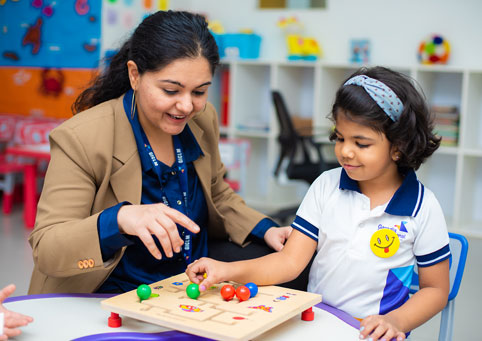
Garodia FinlandWay®️ Curriculum: Ages 2 to 6
For the best early childhood education, GICLM has collaborated with the leading international practice. FinlandWay®️ is a versatile preschool program focused on the Finnish Early Childhood Education and Care (ECEC) model that is globally recognized. You can be confident that your child's early development is in capable hands with a name like Garodia and established learning methods like FinlandWay®️.
The FinlandWay®️ curriculum is based on Finland's 2018 national academic curriculum. The following topics are included in the thematic learning:
- Languages, stories, and other linguistic abilities
- Exploration and participation in math and science
- Arts and performance, as well as the ability to freely express oneself
- Shared well-being and life skills essential for full growth.
With the World's No. 1 curriculum, FinlandWay®️ trained teachers, we ensure your child's holistic growth. These educators have received specialized training in the Finnish Play, Participatory, and Phenomenon-based education model's pedagogical methods.
We want to ensure that each child is prepared with all of the requisite skills to contribute to society as active and responsible citizens.
Learning is seen as a holistic practice at Garodia FinlandWay®️. Our three-pronged pedagogy is based on the following:
-
Play-based Pedagogy
Playing is more than just an activity for young children; it is a way for them to continuously build innovative experiences and learn from them. They ask questions and, through the course of the game and find answers to these questions. -
Phenomenon-based Pedagogy
The phenomenon-based approach gives kids a reason to understand. It's basically exploration-based learning. It transforms the child into a learning agent in the pedagogical process. It teaches children how to observe and analyse things. -
Participatory Pedagogy
We start teaching children the value of community in learning through this approach. Children learn from their classmates as they participate in the learning process on an equal footing with them. It instils in a child an important social ability.
This three-pronged pedagogical approach enhances one another to provide your child with the best education possible. We ensure that each child's talents are valued, and that the learning process is shaped accordingly. FinlandWay®️ Schools are dedicated to providing the best care and education for your kids, with locations in three continents and seven countries, as well as applications in over ten schools.
Assessment
Assessment plays an important part in helping parents, carers and teachers to recognise children’s progress, understand their needs, and to plan activities and support. Ongoing assessment is an integral part of the learning and development process. It involves teachers observing children to understand their level of achievement, interests and learning styles, and to then shape learning experiences for each child reflecting those observations.
In their daily interactions with children, teachers make systematic observations and assessments of each child's achievements, interests and learning styles. These observations and assessments are then used to identify learning priorities and plan relevant and motivating learning experiences for each child.
At GICLM, we have introduced Tapestry, an on-line journal that can record all the learning and fun of children’s early years’ education. Through photographs and videos, teachers are able to capture children’s experiences as well as monitor development and learning. This unique journal is shared on-line with parents, who are not only able to see special moments, but can view their child’s progress whenever they want.
Each child’s level of development is assessed against a set of Early Learning Goals. Teachers will review each child individually and decide whether where they are in their development:
- Emerging, not yet reaching expected levels of development for age.
- Expected
- Exceeding, beyond expected levels of development for age.
A Welcome from the Head of Primary
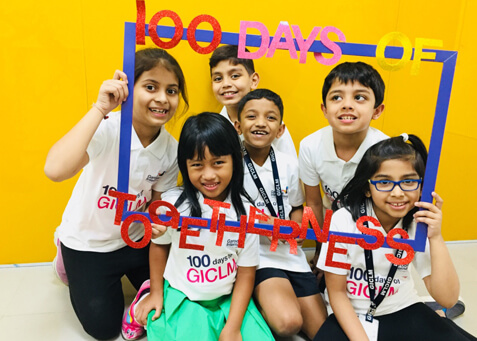
Welcome to the Primary Years at Garodia International Centre for Learning Mumbai. The Primary department is divided into two sections: the Early Years Foundation Stage (age 3 to 5 years) and the Primary Years (age 5 to 11 years).
At Garodias, we believe that learning should be fun, purposeful and effective. The primary years offer the right stimulation for our young learners from early years to develop their knowledge, skills and understanding required for all their learning in the years ahead. We therefore endeavour to provide a stimulating environment, rich experiences, and optimum encouragement and guidance to make this transition seamless. Our school lays a lot of emphasis on values and life skills education, which are interwoven in the strong curriculum. We believe in educating our children for life, livelihood and citizenship.
We follow the International Primary Curriculum (IPC) for the Primary grades and FindlandWay®️ for the early years to enhance learning. Both, the IEYC & the IPC, provide opportunities for global learning, nurturing a love of learning – academic, personal and international, which in turn will equip our young learners with the right skills and attitudes to face the world tomorrow.
Art, technology, music, foreign languages, dance, physical activities are an integral part of this rich curriculum lending itself to the development of the whole child. The excellent staff coming from a diverse international background add different and newer perspectives to their learning experiences.
The Cambridge Primary Curriculum for English and Math provides a great framework to develop the Language Arts & Numeracy in our young learners, providing the perfect foundation for the Cambridge Secondary 1 curriculum in the middle years.
The team at GICLM endeavours to make the learning environment stimulating and enriching thus making it very exciting for our young learners to learn and grow. Apart from the classrooms, children at GICLM have access to a range of specialist areas such as the learning centre, drama studio, music room, LEGO lab, art & design studio, state of the art science laboratories, modern spacious canteen and extensive facilities for sports (swimming pool, gym and in-door courts).
We are sure that your child’s learning experiences here will keep the flame of curiosity alive.
Mahalakshmi Anand
Head of Primary
Assessment
Day-to-day assessment is an essential aspect of effective teaching. It involves the teacher focusing on how learning is progressing during the lesson, determining where improvements can be made and identifying next steps.
During lessons, primary teachers at GICLM will be listening to, observing, checking on the children’s understanding and analysing the responses of the children they are assessing. They will be using a variety of strategies such as questioning, observing and talking with the children on a daily basis.
More formal types of assessment (such as end-of-unit tests, Cambridge Checkpoints) will also be used at regular intervals during the year.
Curriculum
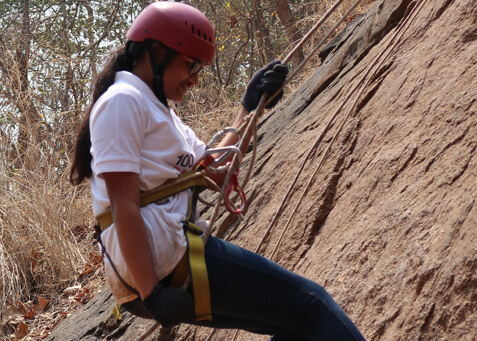
Cambridge curriculum (Grades 6-10)
We aim to create an outstanding learning environment that:
- Develops an ethical education
- Provides excellence and the opportunity for high achievement and the development of 21st century skills.
- Provides an education that creates the opportunities for progression to further education.
- Provides an education suited to the specific needs and strengths of all learners.
- Develops life-long learners who are knowledgeable, effective communicators and enjoy learning through challenging situations.
- Encourages active learning, open enquiry, critical and creative thinking.
- Develops students understanding and responsibility for their own learning.
- Fosters intercultural understanding and actions.
- Provides clear assessment tasks, monitoring, recording and analysis of all learning to improve student achievement.
- Ensures a continuum of learning.
- Offers a rich extra-curricular activities program.
- Integrates technology to enhance the learning situation.
- Undergoes regular self-review and critical analysis.
The curriculum is specially designed for the unique learning needs of students aged 11-16 (Grades 6-10) at the time when they need to develop excellent learning skills and habits, whilst developing self-confidence and a thorough understanding of their academic subjects. This is called a ‘student centred approach’ that builds on traditional learning approaches in the classroom and combines it with the latest educational practices that high quality students are known to exhibit. Students will see the connections between academic disciplines. This continuum of learning prepares students with the skills, knowledge, conceptual understandings and habits that lead to long term success.
Students follow the Cambridge curriculum through to the international IGCSE examinations at the age of 16. There is an emphasis on a core set of subjects: Maths, English and the Sciences (Physics, Chemistry and Biology) with choices in: Social Sciences (History, Geography, Economics), Art, Music, PE, Information Technology and Drama ensuring a broad range of academic experiences and the development of critical thinking and individual research.
We focus on the holistic educational development of students and have created a Personal, Social, Health and Careers Education (PSHCE) curriculum that supports the learning and the personal needs of students. Additionally, there is an Entrepreneurial education programme followed by all. Proudly, we are the only school in India with permission to operate a Lego Laboratory and its associated curriculum that supplements STEAM learning.
Assessment
The main purposes of assessment are to help students improve continuously explaining why students have achieved a certain grade (formative assessment) using the information gathered about their learning, improve teaching, evaluate the effectiveness of the curriculum, provide summative information, inform students and parents about progress and to gain qualifications to move onto the next stage of education.
GICLM has formal procedures and defined criteria to effectively and regularly assess and review the impact of learning strategies and the level of student performance. Its purpose is to motivate all developmental aspects such as intellectual, creative, physical, emotional and social development of students. GICLM aims to have systems that track, analyse and report student performance giving a profile of the student highlighting strengths, areas for improvement and suggesting strategies for improvement. Students’ grades may ‘regress’ as well as ‘progress’ from one report to another. This may reflect the different skills being judged or a more difficult stage of the course.
Full reports will be issued twice a year that give an achievement and an effort grade, showing the level the student has reached at that time, with a written comment explaining ‘why’ and ‘how’ this grade was reached alongside the skills displayed. Targets will be identified suggesting clear strategies/ actions for improvement.
Short Reports will be issued twice a year that give an achievement and effort grade to judge progress.
Formal Student Parent Teacher Conferences will be held to review progress and identify targets for improvement.
Assessment is a continuous process throughout all learning. Teachers monitor the progress of students and the Student of Concern system operates when students are not realising their academic potential. From this a focused Action Plan is created and, with parents, steps are taken to help the student in the areas that need improvement.
All assessments are criterion referenced according to the relevant Cambridge levels. This means that students are assessed using discrete levels of skills and knowledge that they are expected to achieve.
At the end of each academic year there are formal End of Year examinations that give students vital experiences under a certain amount of pressure, help them develop successful techniques and give a further indication of their progress. Teachers will give tests throughout the year according to the needs of their subject.
External formal examinations take place during Grade 8 using the Cambridge Checkpoint and at the end of grade 10 when students complete their IGCSE examinations.
Curriculum
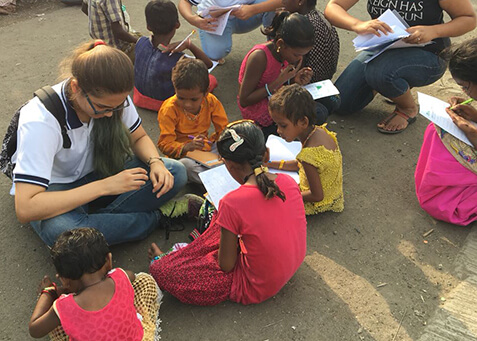
High School: The International Baccalaureate Diploma Programme (grades 11-12)
The pre-university programme for 16-19 year olds is the acclaimed Diploma programme. Designed for highly motivated students it offers a genuine international curriculum with high-quality assessments. Universities recognize that IB students have advanced skills and knowledge and so they gain access to the very best institutions worldwide. The Diploma consists of six subject groups. Three of these must be followed at Higher Level (HL) and the rest at Standard Level (SL). Students follow a common core of Theory of Knowledge (TOK), write an Extended Essay of 4,000 words related to their academic interests and participate in Creativity, Action and Service (CAS) making a difference to the communities in which we live.
The subjects offered at GICLM include the following:
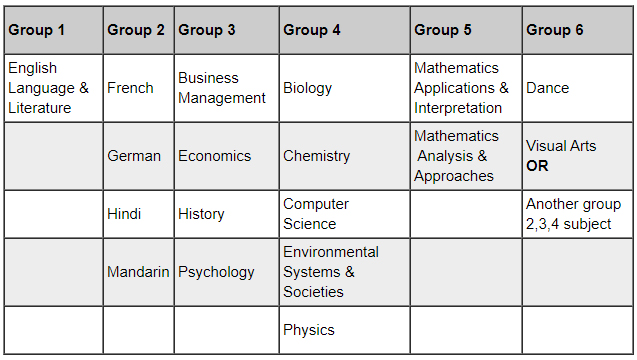
Assessment
High School: The International Baccalaureate Diploma Programme (grades 11-12)
The assessment cycle and procedures follow the same as the Secondary school. Grades are awarded on a scale of 1-7 with 7 being the highest possible score. Examinations and coursework are completed at the end of Grade 12 and are examined by teams of international examiners. Standards and quality are monitored.
- The assessment cycle and procedures follow the same as the Secondary school.
- Grades are awarded on a scale of 1-7 with 7 being the highest possible score.
- Examinations and coursework are completed at the end of Grade 12 and are examined by teams of international examiners. Standards and quality are monitored.
Homework
Homework is an important aspect of learning extending classroom learning, understanding and preparation. This may include projects, individual or group assignments. Homework begins from Grade 6 onwards.
Pastoral Care
Garodia FinlandWay®️ teaches a Personal, Social, Health, Careers Education course for all students. Key topics appropriate to age groups are tackled. Additionally, all students have a personal tutor who looks after their overall progress and wellbeing. A school Counsellor is a full time member of staff.
School, Family and the Community
GICLM is a community school and we value the contributions of parents and individuals. We have a strong Parents Representatives group that meets to join in discussions about school improvements. Parents meet teachers regularly to discuss academic progress of students.
